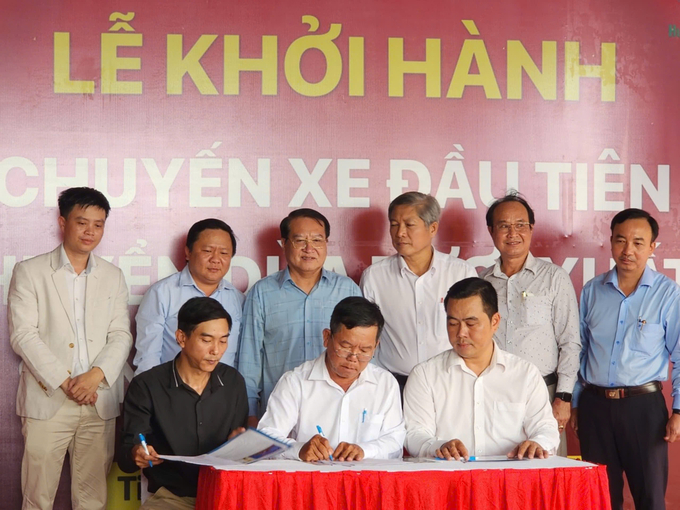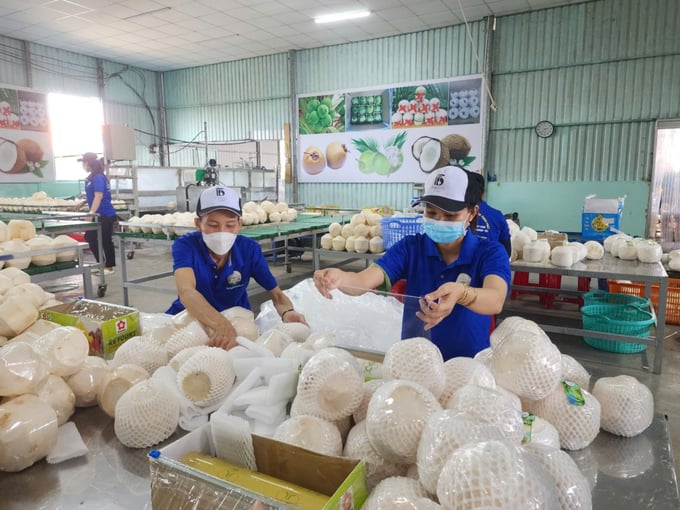May 24, 2025 | 16:25 GMT +7
May 24, 2025 | 16:25 GMT +7
Hotline: 0913.378.918
May 24, 2025 | 16:25 GMT +7
Hotline: 0913.378.918
On the afternoon of October 24, at the Hung Thinh Phat Cooperative (Quon Long Commune, Cho Gao District, Tien Giang Province), the Department of Industry and Trade of Tien Giang Province, in coordination with FADO IEXPORT Joint Stock Company, held the “Launch Ceremony for the First Shipment of Fresh Tien Giang Coconuts for Official Export to China.”

Mr. Pham Van Trong (third from left, back row), Vice Chairman of the People's Committee of Tien Giang Province, observes as units sign the agreement for the transportation of the first three official shipments of fresh coconuts from Tien Giang to China. Photo: Minh Dam.
The export of fresh coconuts requires strict conditions during transportation. The coconuts must be kept at a stable cold temperature of 2-3°C with 30% humidity. Proship Joint Stock Company has developed and provided a new-generation self-powered refrigerated container solution to meet the demand for coconut exports to China, ensuring stable temperature and humidity throughout the journey. Chinese customers can monitor the container's temperature and humidity remotely, 24/7.
Moreover, this is the first time fresh coconuts have been transported by Proship via rail deep into the interior provinces of China. The rail method allows for quick customs clearance, avoids congestion at border gates, and offers more competitive transport costs than road transport.
Tien Giang has a large coconut growing area in the Mekong Delta, covering over 22,400 hectares, of which approximately 60% is for drinking coconuts. In the recent inspection of coconut cultivation areas and packing facilities in September, Tien Giang had three growing areas and two packing facilities approved by China for export. Mr. Nguyen Trung Qui, Director of Hung Thinh Phat Cooperative, stated:
“To secure the first three export containers today, we promptly registered the cultivation area codes and packing facility codes. Fresh coconuts are sourced from Cho Gao district’s cultivation areas, with each coconut weighing at least 1.3 kg. Exporting to China brings a higher selling price than the domestic market, so in the long run, farmers and businesses need to collaborate to select suitable varieties. Currently, the three preferred varieties in the Chinese market are hybrid Siam, Malayan dwarf, and green Siam coconuts, all of which must be grown to VietGAP standards.”

Pre-processing fresh coconuts for export at the packaging facility of Hung Thinh Phat Cooperative. Photo: Minh Dam.
To date, Vietnam has 15 agricultural products approved for official export to China, including durian, bird’s nest, sweet potato, dragon fruit, longan, rambutan, mango, jackfruit, watermelon, banana, black jelly, mangosteen, lychee, passion fruit, and coconut.
According to Pham Van Trong, Vice Chairman of Tien Giang Provincial People's Committee, Tien Giang's total export turnover in the first 10 months of 2024 is estimated at USD 4.975 billion, up by 11.27% and reaching 99.5% of the annual plan. Fruit and vegetable exports reached over 46,000 tons, valued at USD 112.43 million, marking an 86% increase in volume and a 79% increase in value year-over-year. Notably, in the first nine months, durian exports to China accounted for 47% of the province's total fruit and vegetable export turnover.
The Vice Chairman requested that the Department of Industry and Trade coordinate with the Department of Agriculture and Rural Development and related agencies, units, and localities to quickly complete plans for the development of strategically advantageous, appropriately scaled coconut-growing areas, linked with support for adaptive infrastructure investments and increased trade promotion to potential markets.
In addition, the province aims to guide farmers and cooperatives in registering planting area codes and packing facilities. Proper monitoring of the issuance, management, and usage of planting area and packing facility codes should be implemented. Moreover, farmers are encouraged not to expand cultivation areas spontaneously.
The departure ceremony for the first official shipment of fresh coconuts exported to China marks an important milestone, not only representing a new advancement in the agricultural sector but also contributing to the enhancement of the value of Vietnamese agricultural products in the international market.
Translated by Mai Quang Huy

(VAN) In the tranquil wetlands of Van Long, there are quiet souls who guard the forests, nurture the waters, and oversee every bird and troop of langurs as protecting the essence of a living heritage.

(VAN) WWF, GIZ, IUCN, UNDP call for biodiversity conservation and sustainable development must be regarded as a unity in strategies for a green future.

(VAN) On celebration of International Day for Biological Diversity, Deputy Minister Nguyen Quoc Tri called for practical actions to address nature and biodiversity conservation.

(VAN) Dr. Hoang Thi Thanh Nhan – Deputy Director of the Nature and Biodiversity Conservation Agency – highlighted this on the International Day for Biological Diversity, May 22, 2025.
![Ho Chi Minh city adapts to climate change: [2] Accelerating action](https://t.ex-cdn.com/nongnghiepmoitruong.vn/608w/files/chiqk/2025/05/22/4024-4220-bien-doi-khi-hau-1-100626_766.jpg)
(VAN) Clearly recognizing the challenges posed by climate change, Ho Chi Minh city has swiftly shaped its policies and implemented practical solutions to adapt.

(VAN) Rice straw is no longer just a discarded byproduct, but it is becoming a green resource that helps farmers in the Mekong Delta reduce emissions and promote circular, sustainable agriculture.

(VAN) Other Effective Area-based Conservation Measures (OECMs) are solutions that contribute effectively to achieving the goals of the Kunming–Montreal Global Biodiversity Framework.